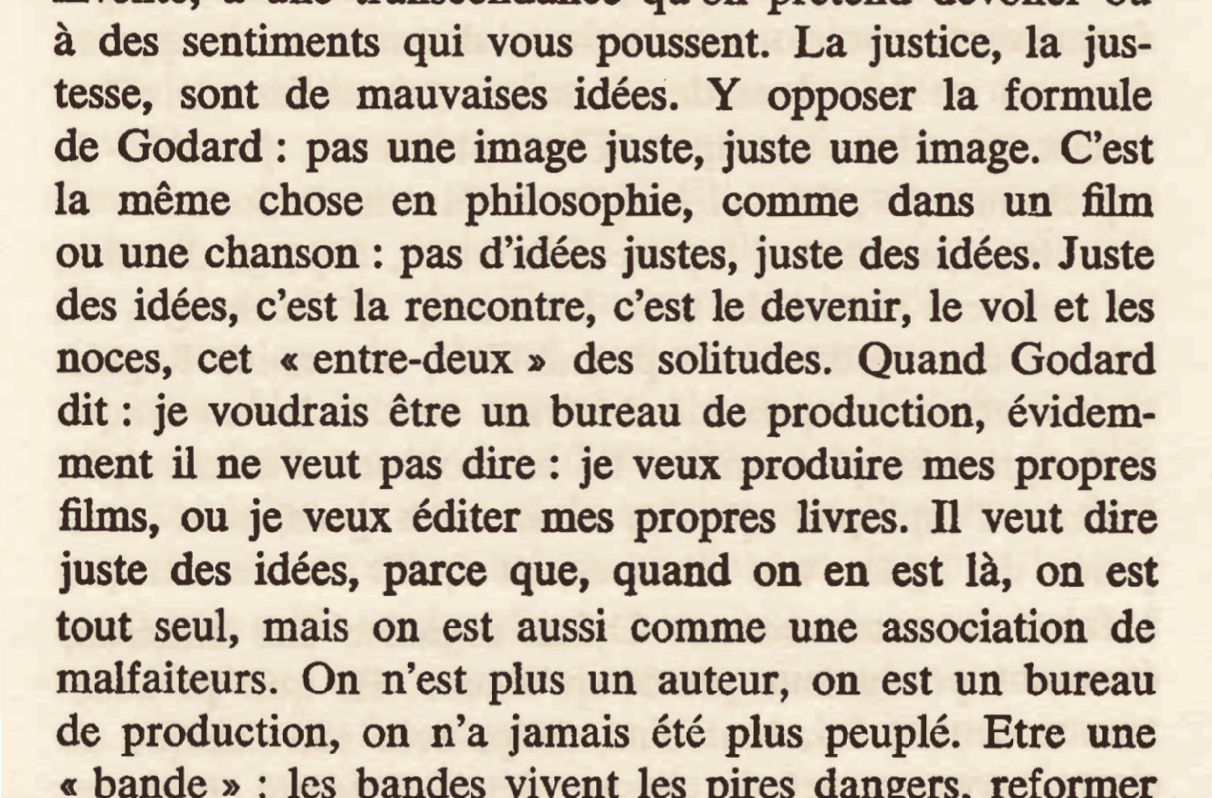
“[D]iscussion has no place in the work of philosophy. The phrase ‘let’s discuss it’ is an act of terror.” Words like these leave little doubt that Deleuze despised discussion. Discussion, after all, was (and still is), the prime discipline of academic and para-academic show-off, the sterile discourse of subjects-supposed-to-know; and discussion’s more photogenic sibling, debate, was, from the 1970s onward, the domain of the so-called nouveaux philosophes, who claimed, at least according to their critics, mediatic hegemony.
A dialogue, on the other hand, an actual conversation, may be something entirely different. “We need conversation,” Deleuze confirmed towards the end of his life. “But the lightest conversation is a great schizophrenic experiment happening between two individuals with common resources and a taste for ellipses and short-hand expressions. Conversation is full of long silences; it can give you ideas.” Where an exchange, then, is not merely “an exercise in narcissism where everyone takes turns showing off”, where it is a true dialogue (or polylogue), it can, in fact, force the collective creation of ideas. Of course we still tend to think of the philosopher as a solitary creature, sitting at a desk, or anywhere, as it were, thinking hard until enlightenment strikes. And no doubt: philosophy does require careful consideration and well-argued sequences of propositions, and the necessary rigour demands time, quiet time, quiet time alone. But philosophers are also creatures of habit, and habit, though its condition, can make thinking lazy. A conversation, a dialogue, a polylogue, then, whether with an artefact or a living, even with a non-living being, may force it back into movement.

“[…] to feelings which motivate them. Justice and correctness are bad ideas. Compare Godard’s formula; not a correct image, just an image. It is the same in philosophy as in a film or a song: no correct ideas, just ideas. Just ideas: this is the encounter, the becoming, the theft and the nuptials, this ‘between-two’ of solitudes. When Godard says he would like to be a production studio, he is obviously not trying to say that he wants to produce his own films or he wants to edit his own books. He is trying to say just ideas, because, when it comes down to it, you are all alone, and yet you are like a conspiracy of criminals. You are no longer an author, you are a production studio, you have never been more populated. Being a ‘gang’ – gangs live through the worst dangers; forming […]”
I often return to Deleuze, perhaps out of lazy habit indeed; sometimes I worry that he may have become too much of a household god. But then again, although I’ve grown more critical of some of his ‘idealistic’ moments, I cannot but acknowledge the extent to which his work, along with the co-authors Félix Guattari and Claire Parnet, has influenced my thinking and my image of thought. We never think alone; with voices dead and alive resounding, “each of us [is] several,” and so there’s always “quite a crowd”. Names become author-functions, and any book, then, whether officially co-authored or not, may in truth be a dialogue, a conversation, though to varying extent. Deleuze and Parnet’s Dialogues, first published in 1977, celebrate this conversation with its arbitrary cuts and blurry borders, its echoes and inventions, “and the AND Félix, AND Fanny, AND you, AND all those of whom we speak, AND me, would appear as so many distorted images in running water.”
So the Dialogues have been and are, in many ways, important for diffrakt. Not only because a screening of their later companion piece, the eight-hour Abécédaire, retroactively became a foundational event, but also because the conversation has become an ideal, a difficult and doubtlessly dangerous ideal, constantly threatened and threatening to turn into an immobile and immobilising fetish. It seems like we never quite know what a conversation is or should be.
Perhaps every conversation must invent conversation(s) anew. There are no conversations, Deleuze and Parnet might have said: only becoming-conversation.
an’ not t’ worry about the new rules
for they ain’t been made yet
Moritz Gansen